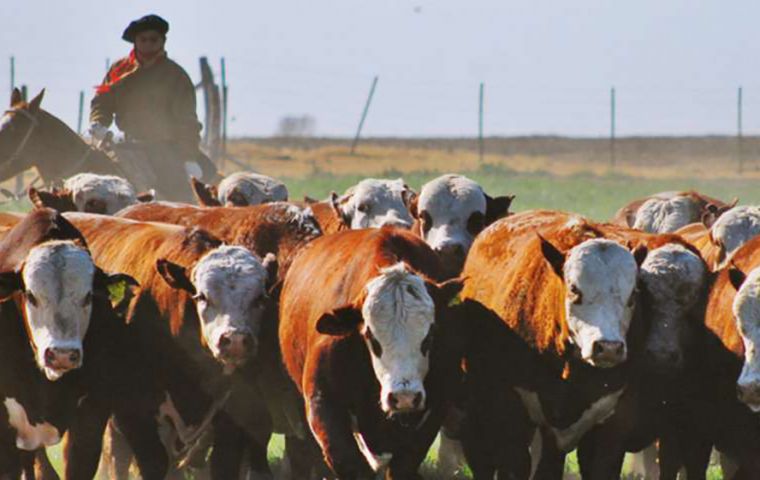MercoPress. South Atlantic News Agency
Argentina reinstates beef exports registry
 The goal of the measure is to “improve the monitoring of beef exports and the supply to the domestic market,” the government said in a statement.
The goal of the measure is to “improve the monitoring of beef exports and the supply to the domestic market,” the government said in a statement. Argentina's government Thursday created a registry of beef exporters among other measures to curb under-invoicing, which authorities fear has been going on for a while now.
The announcement was made by the Office of the Cabinet Chief (Santiago Cafiero) and the new system is to function within the Ministry of Productive Development's Domestic Trade Secretariat.
The goal of the measure is to “improve the monitoring of beef exports and the supply to the domestic market,” the government said in a statement.
“The Ministry of Agriculture, Livestock and Fisheries establishes further requirements for the export of beef to generate more transparency and traceability and avoid illegal and speculative practices,” the statement goes on.
A commission made up of representatives of the ministries of Agriculture, Livestock and Fisheries and of Productive Development, together with control organisms, is being eyed, it was reported.
To avoid under-invoicing of exports, the federal tax bureau AFIP will also oversee beef exports by updating all reference prices to set in motion an affidavit system that will allow authorities to monitor the export of beef and control the presumed gap between prices stated in the invoices upon shipping of the goods and those actually charged to buyers at the port of destination
Coupled with the exports registry, a new operating scheme for the domestic market has been envisioned: “This measure protects the workers of the sector, improves the operation of production and the access of consumers to the different cuts, stimulating a more efficient operation of the beef chain,” the statement read.
At the other end of the table, beef producers grouped under what is known as the Liaison Commission were against the Export Registry and warned the measure would affect output and employment.
The four national agricultural entities expressed in a statement their “utmost absolute rejection” to the reinstatement of the Export Registry, something which “has already been implemented in the recent past with counterproductive results for production, activity and employment.”
An export registry is already in use for the export of cereals and oilseeds and it helps authorities verify that companies that sell animal protein abroad comply with solvency requirements, trajectory and that they respect market prices.
The Liaison Commission sees the measure as just another piece of red tape which adds to the “unnecessary bureaucracy with already failed records and instruments, [which are] the opposite to the need to generate positive expectations about production and investment.”
They insisted “the cause of inflation, including the increase in food prices, is the excess of monetary issuance as a result of galloping public spending.”




Top Comments
Disclaimer & comment rulesCommenting for this story is now closed.
If you have a Facebook account, become a fan and comment on our Facebook Page!